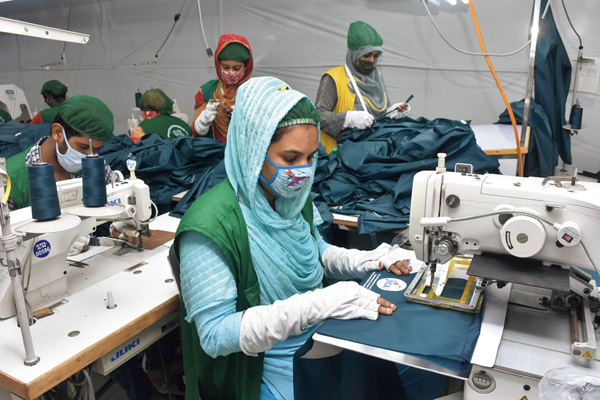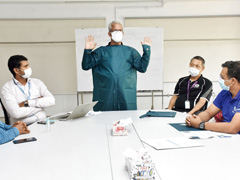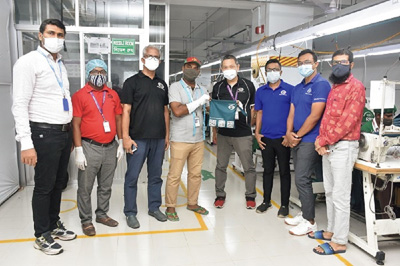Special Issue
South Asia
The Beat of 1.8 Billion People
Responses to COVID-19 Health
Providing Comprehensive Support to Prevent Infection

Manufacturing gowns at a local factory
Now Bangladesh has more than half a million total COVID-19 infections. The government of Bangladesh and Japan, private companies, universities and more have been working to prevent the spread of infections.
The situation in Bangladesh and coordination with JICA
Since the first COVID-19 patient was confirmed in Bangladesh on March 8, 2020, the number of people infected in the country has, as of February 22, 2021, risen to 543,351, with 8,349 deaths attributed to COVID-19. While the measures of the government of Bangladesh have been successful in containing the numbers of cases and deaths to a certain extent, the situation remains unpredictable.
JICA is already expanding its initiatives on a global scale, [1] and has also continued to provide prompt cooperation from the earliest stages of the pandemic in Bangladesh, including by supplying materials such as protective clothing, masks, and gloves, instruction in hygiene and sanitation measures, awareness-raising activities for prevention, and the provision of emergency ODA loans.
Public-private partnerships for clinical support
One notable example of cooperation is the creation of a system to produce medical gowns in Bangladesh where the garment industry is growing the most, making use of one of the country's strengths, its human resources and production facilities in the garment industry.
In May 2020, Bangladesh was suffering from a shortage of gowns, masks, goggles and other personal protection equipment. As these could not be produced domestically, the country relied on imports, and there were many cases of medical workers getting infected due to using low-quality products. So, JICA has started an initiative with the WHO to manufacture gowns for medical workers in Bangladesh. However, to meet WHO's standards required professional-level work including inspection and quality control techniques to check sewing quality and defects. In Dhaka, where most Japanese had left, YUDA Toshihide of KEN2 Co., Ltd. stood up to be counted, "As a person doing business in Bangladesh, I wanted to do something for the people here." While their situations were different, it may well be that the other Japanese remaining in Dhaka at the time also felt this way. The WHO and people from the Ministry of Health and Family Welfare (MOH&FW) welcomed the introduction of Japanese quality control techniques with high expectations.

Quality control study meeting
However, KEN2 had never done inspections and testing for personal protection equipment for medical workers. WHO, the Bangladesh University of Engineering and Technology (BUET), and local research institutions studied WHO standards. Using their expertise in quality control for the clothing they normally handled, the team completed the guidelines and a manual for quality control. Next, a reliable local manufacturer was sought to create a prototype medical gown based on the guidelines. Snowtex was eventually chosen from more than a hundred candidate companies. A Snowtex representative said, "Times are tough, but I can't see us laying off any of our employees, because they're the reason we are able to make our products to the highest quality standards. I think it's amazing that the gowns we make together are going to protect medical workers."
Obtaining the prototype, the Director General of Drug Administration said that "Japan and Bangladesh have built a very good relationship ever since Bangladesh's independence. The medical workers on the front lines of fighting infection would definitely be reassured by Japan's support." The prototype was confirmed to pass the personal protection equipment standards [2] set by MOH&FW, and completed gowns were distributed to medical workers in Bangladesh.
Commenting on the initiative, YUDA said, "All our employees were feeling down due to the cancellations of work during the coronavirus pandemic, but now they're all proud to have been able to help so many medical workers throughout Bangladesh."
JICA has provided cooperation in a range of areas to suit the diverse needs inherent in the field of health, including improving maternal and child health, health systems, and periodic nurse training. Recently, we have also focused on cooperation through relationships with private-sector companies. We shall use the local networks established over the years to the fullest extent as we tackle the unprecedented problems caused by the COVID-19 pandemic.

Project members from KEN2 and Snowtex (YUDA 4th from right)
Note
- [2]In compliance with WHO standards





scroll